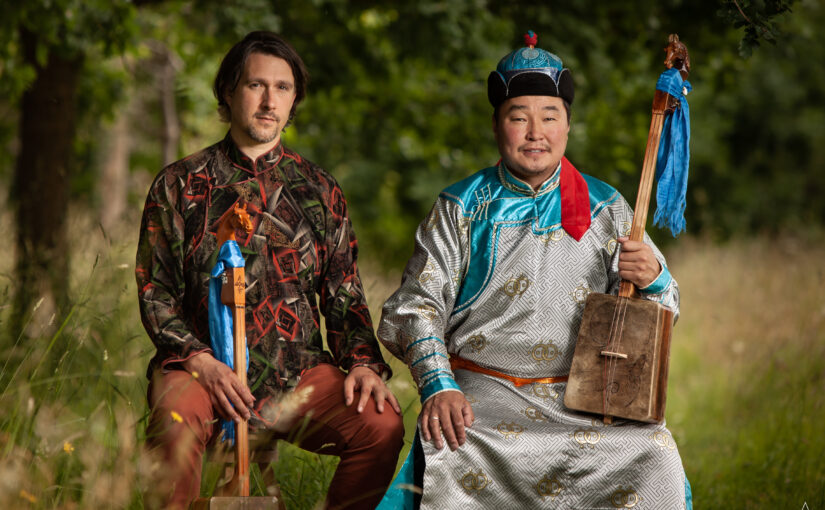Diversity of khöömii: approaches to Mongolian and Tuvan throat singing
Teachers : Johanni CURTET, Batsükh Dorj & Bardandorj Avirmed
In partnership with Routes Nomades
FOREWORD
Did you know that anyone can produce several sounds with a single voice? A khöömiich (Mongolian diphone player) can, on his or her own, emit a vocal drone and simultaneously produce a melody of harmonics surrounded by various resonances. This vocal acrobatics may seem virtuoso, but it’s accessible to everyone if we’re given the keys. Anyone can be introduced to diphonic singing (khöömii).
Johanni Curtet will be accompanied by Tuva soloist Batsükh Dorj to explore the full range and diversity of the khöömii technique. Over the course of the workshop, they will be contributing theoretical and practical elements from their complementary approaches: ethnomusicological for Curtet and as close as possible to the tradition of the Tsengel Tuvas (Mongolian Altai) for Dorj.
With this method, everyone can leave with the tools they need to develop the art of khöömii seriously, while remaining as close as possible to traditional practice.
PURPOSE
Discover the specificity of the diphonic singing technique and its repertoire through an ethnomusicological approach and the oral transmission perpetuated by a holder of the Tuvas tradition.
Learning the basic techniques :
• sygyt (whistled diphonic singing),
• khöömei (pressed diphonic singing),
• kargyraa (deep diphonic singing)
Learning one or more songs in the Tuva language, sung in a clear voice and then, depending on the level of the students, in a ‘pressed’ voice and kargyraa. Depending on the student’s level and progress during the masterclass, integration of diphonic techniques into the repertoire.
Collective and individual transmission.
SCHEDULE
10am – 1pm; 2.30pm – 4.30pm
CONDITIONS OF PARTICIPATION
Open to all, no basic pre-requisites (18 years and over). Younger participants: please contact us.
REGISTER NOW
>> ON-LINE REGISTRATION <<
>> RATES & REGISTRATION PROCESS <<
VIDEOS EXTRACTS
BIOGRAPHIES
BATSÜKH DORJ
Batsükh was born in 1990 in the municipality of Tsengel, in the province of Bayan-Ölgii in Mongolia. Initiated by Papizan Badar, he learned Khöömei with his older brother Bütemj, and listened to the recordings. He developed his practice in Tuva alongside the famous overtone singers of the Alash and Chirgilchin ensembles. He graduated from the music college of the Tuva Republic (Russia). He masters several techniques of Khöömei, in Mongolian and Tuva styles: Khöömii (pressed overtone singing), Sygyt (whistled KhöömIi), Kargyraa (deep Khöömei), ezengileer, borbagnadyr; the playing of the igil fiddle and the toshpuluur lute; and violin making, learned from Aldar Tamdyn. Batsükh participates in many traditional festivals and arts competitions, as well as in national and regional Khöömei competitions.
Discography :
-Une Anthologie du khöömii mongol, (2017, Buda Musique/Routes Nomades)
-Ögbelerim – Music for my Ancestors (2023, debut album, Buda Musique/Routes Nomades)
Filmography :
-Voyage en diphonie, by J.-F. Castell (2018 Les Films du Rocher, Hors/Champs-Contre/Champs, A ProPos productions. ‘Coup de cœur’, Académie Charles Cros
Video links :
JOHANNI CURTET
Johanni Curtet is a musician, ethnomusicologist, teacher of overtone singing and producer. Trained first by Tran Quang Hai, his traditional learning was provided to him by D. Tserendavaa in the Altai Steppes, and B. Odsüren at the University of Arts and Culture of Ulaanbaatar. He teaches Khöömii at the Philharmonie of Paris, the University Rennes 2, Le Pont Supérieur, DROM; in festivals such as Les Suds in Arles, Les Orientales, for professional musicians (Camille), the associative network in amateur practice, and recently at United States universities on the East Coast. Apart from his main trio, Meïkhâneh, he has played with Voix du Sahel (C. Zekri, Y. Moumouni…); in trio with Tserendavaa & Tsogtgerel, in Urbi&Orbi by Pierrick Lefranc (with X. Dessandre Navarre, J. Florent, S. Bernardo, J.-B. Henry) or the electric opera Eve futures by Alain Basso (with É. Trémolière, L. Tejeda…). As a researcher, he is a temporary employee and attached to the University Rennes 2. In 2010, he participated in the inscription of Mongolian Khöömii on the representative list of the Intangible Cultural Heritage of Humanity at UNESCO.
Discography:
• Une Anthologie du khöömii mongol, (2017, Buda Musique/Routes Nomades)
Filmography:
• Voyage en Diphonie, de J.-F. Castell (2018, Les Films du rocher)
In partnership with Routes Nomades:
Texts : Johanni Curtet
Information: www.routesnomades.fr
Copyright photos : © Sh. Nomindari
